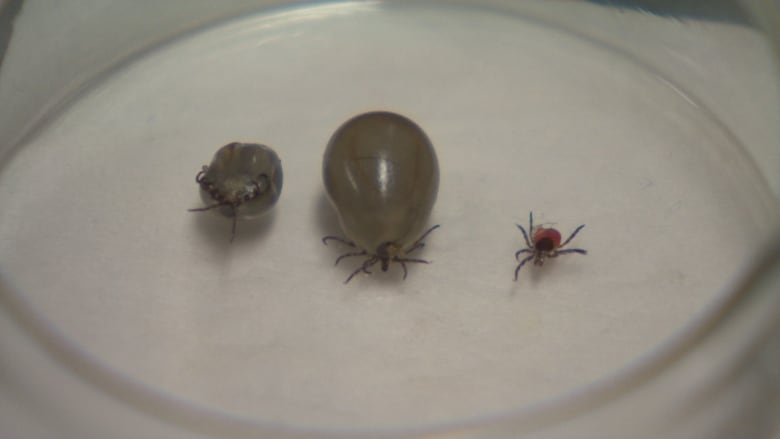Health officials warn to guard against ticks as weather warms
Reduce the risk of Lyme disease by covering up, using bug spray, health officials say

The provincial government isencouraging people to protect themselves from tick bites and reduce the risk of Lyme disease when spending time outdoors as the weather warms up and the bugs re-emerge.
According to Public Health Ontario, the numbers of "confirmed and probable cases" tripled in the summer of 2017.
Last year, the province saw 997cases of Lyme disease.
Douglas Sider, a physician with Public Health Ontario, said the increase of cases can be attributed to the hot weather.
"The other thing and we've got good data to support this is that the tick and where it's found, is slowly expanding in Ontario, especially across Southern Ontario," he said.
Did you know ticks cant fly or jump? They wait on the tips of grasses and shrubs with their front legs stretched out ready to latch on when humans or animals pass by https://t.co/G2tJi2xbS3 pic.twitter.com/TLOtrDZJcE
—@ROWPublicHealthThe Ontario government is advising people living or visiting wooded areas with tall grass, rushes or moist environments to take the following precautions:
- Staying on marked trails.
- Wearing long sleeves, pants, socksand closed shoes.
- Tucking pants into socks and wearing light-coloured clothing to make ticks more visible.
- Using insect repellent withDEETorIcaridinon clothes and exposed skin.
- Checking the body thoroughly for ticks after being outdoors, as promptly removing ticks can help prevent infection.
The government is asking the public to consult a health care professional if a person experiences any of these symptoms after a tick bite: skin rash, headache, fever, muscle and joint pain, spasms, weakness, numbness or tingling and generally feeling unwell.
When doing a full body check for ticks, people are asked to use a mirror or have someone else check their body for them.They are also asked topayclose attention to areas such as behind the ears and knees, scalp, ankles, armpits, groin and navel.
The greatest risk of getting the diseaseis during the spring and summer months.
"Lyme disease is the greatest imitator," said RossannaMagnotta, co-founder of theG. Magnotta Foundation for Vector-Borne Diseases in Guelph.
"The people who have it their pain is quite severe," she said.
"It might be camping or the outdoors, but those aren't the only place you can get a tick-bite.It can be anywhere."












_(720p).jpg)


 OFFICIAL HD MUSIC VIDEO.jpg)
.jpg)



























































































